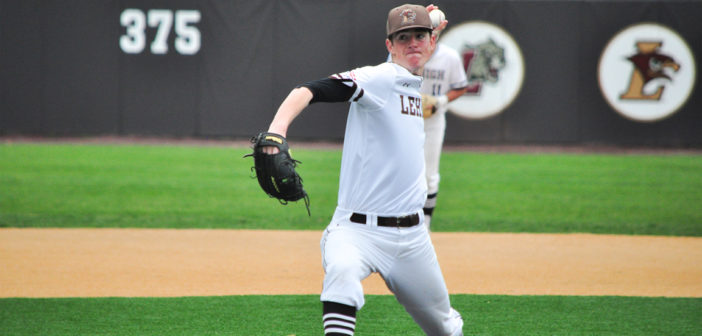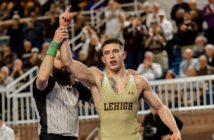When Lehigh’s baseball season was cut short in March, just 15 games into their 54-game season, Gerard Sweeney and his teammates turned their attention toward the next opportunity to play.
After taking some time off, Sweeney, a sophomore third baseman, began to prepare for summer league baseball — an extension of the spring season the majority of returning players participate in, according to head coach Sean Leary.
Unbeknownst to him at the time, Sweeney’s fall commitment to play summer baseball in the Alaska League gave him a significantly better chance to embark on his initial plans than some of his teammates — or so he thought.
Sweeney said he thought Alaska’s remoteness, with only 411 confirmed coronavirus cases as of June 2, coupled with the state’s decision to reopen businesses in full on May 22, made it a more ideal place to play baseball in summer 2020.
It didn’t matter.
The Alaska Baseball League was canceled on May 22, with the league’s Mat-Su Miners and Anchorage Glacier Pilots still hoping to play a month-long season in July. However, on May 27, that plan also succumbed to the uncertainty of the coronavirus.
Aside from the opportunity to develop as a player and showcase himself at the national level, Sweeney was looking forward to climbing glaciers, playing night golf and just exploring nature. For now, those plans have been altered. And he’s not alone.
As of June 2, 14 of the 37 summer baseball leagues listed on baseballamerica.com have been canceled. Of the remaining 23 leagues, only 12 are hoping to begin play before July, a number that will almost certainly decrease before then.
However, Leary said the issue is even larger than how it appears on paper. He said, of the approximately 15 most popular leagues that Lehigh players participate in, only the South Florida Collegiate Baseball League is still set to begin on time, with most prominent leagues having already been canceled.
Almost the entire roster has had their original summer placements moved, Leary said, with many seeking play in newfound local leagues or further south where more leagues are still scheduled to play. Those in situations like Sweeney, who faced late cancellations, are in an especially tough spot.
“Every team was full by about April,” Leary said. “A lot of teams fill in the fall but leave a couple spots for the spring, so when teams were canceling it wasn’t as if they could just call another team and a roster spot was open. It would have to be that a kid got injured that was supposed to play in that league.”
While some local leagues, such as the Baseball U PA Collegiate Summer League, have recently been created to provide an opportunity for local players to play, Leary said the excess of demand compared to the supply of roster spots represents a significant issue right now. He said there “aren’t going to be enough chairs when the music stops.”
Leary and his coaching staff have been updating their players through Zoom meetings, giving them workout plans and trying to help them land roster spots any way possible, but Leary said the current environment is uncertain, and he recognizes plans can quickly change.
“Some kids are going to have to train on their own, so we have to make a decision as coaches in probably two weeks,” he said. “What do we do if the next time they play is for us in September? Do we shut them back down?”
While many players have been able to find baseball alternatives, it is not the summer they originally imagined. Some went from playing in nationally prestigious leagues to small local leagues, while others have sought play in southern areas like Florida.
“But everyone in the country, everyone that was going there, is in the same situation… There’s nothing you can do about it really.”
-Luke Rettig
Sophomore pitcher Luke Rettig planned on playing in the prestigious Cape Cod League before it was canceled. He then secured a roster spot to play in the Cal Ripken League before that shut down as well.
He and fellow sophomore pitcher Mason Black have shifted their concentration to playing in Florida after Black also became teamless following the Cape Cod League’s cancellation.
“It was actually kind of crazy,” Black said. “It all happened super fast. On (May 21), I was talking with Luke Rettig, and he told me he had a contact to go down (to Florida) as well, and he was like, ‘You should definitely try.’ On a whim, I texted (freshman pitcher) Will Grisack the next morning, and he ended up reaching out to the general manager. By the end of Friday afternoon, I was on the team.”
Others, however, have been left with playing near home as their best case scenario.
Sophomore infielder Chase Carlson and freshman catcher Adam Retzbach were going to play in the New York Collegiate Baseball League before its cancellation. Retzbach is now planning to play close to home in the Baseball U PA Collegiate League, while Carlson is playing in a Houston-based league near his hometown, also created in 2020.
Leary said even with some players having luck in finding alternatives — for now — the situation is disappointing on multiple levels.
Leary said that, different from the spring season, summer baseball can serve as a time for top players to establish themselves as potential MLB draft picks, with many pro scouts attending the most well-known leagues.
The Mountain Hawks’ top four pitchers were slated to participate in the Cape Cod League, Leary said. Prior to 2020, the league never had more than two Lehigh participants in a summer.
Former Lehigh pitcher Levi Stoudt, ‘20, a participant in the Cape Cod League, was drafted in the third round of the MLB Draft last year. With players being forced to stay local and social distancing still in effect in many places, the scouting opportunity will not be as prevalent this summer, Leary said.
“I was definitely disappointed to not go to the Cape,” Rettig said. “But everyone in the country, everyone that was going there, is in the same situation, so it’s kind of like you have to make do with what you got. There’s nothing you can do about it really.”
Even with that disappointment, Leary said the lost scouting attention is replaceable and that top players will always find a way to be noticed. He is a little more concerned that the lack of opportunity for younger players may be detrimental to their development.
While Leary said he wants to have as many players participating in summer baseball as possible, he is wary of the uncertainty of the coronavirus and emphasizes safety first.
With many playing opportunities coming down south, where some states are closer to fully opening, Leary said he wants to make sure parents are comfortable with their sons playing baseball before having them commit to a league. While many parents have approved of the opportunity, Leary said several players, have chosen not to participate in summer ball due to their parents being uncomfortable with the situation.
“I want every kid’s parent to endorse it as OK, because if I’m a parent, I don’t want to send them to an area where it is not safe right now,” Leary said. “So that’s the other concern, what are the areas that are still at least in the yellow or the green (phases of reopening), and it has honestly kind of been just south Texas and south Florida.”
Despite coronavirus concerns still looming in southern areas, Rettig, Black and Carlson said they are not overly worried about the coronavirus, instead focusing excitement toward playing baseball again.
For now, the players said their main focus is just on getting better in preparation for the fall and spring 2021 seasons, as long as those go ahead as planned.
Some, like Sweeney, are continuing to try to land summer roster spots.
“I reached out to (Leary) and let him know I’d still love to play this summer, and hopefully if there are any openings, I’d be able to take them,” Sweeney said. “But, as of now, I haven’t heard any good news really. It might just be a men’s league, local, something smaller around my area that I can play in.”






Comment policy
Comments posted to The Brown and White website are reviewed by a moderator before being approved. Incendiary speech or harassing language, including comments targeted at individuals, may be deemed unacceptable and not published. Spam and other soliciting will also be declined.
The Brown and White also reserves the right to not publish entirely anonymous comments.